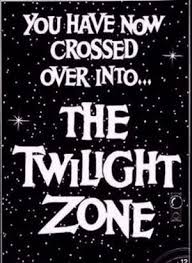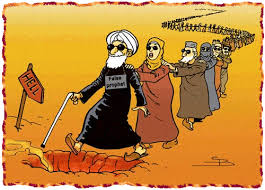 If you are anything like me, various episodes of the Twilight Zone, in addition to entering pop culture, provide food for thought. No, the episode where William Shatner overacts is not the one I have in mind. Shatner is even a parody of himself, but at least he embraces it!
If you are anything like me, various episodes of the Twilight Zone, in addition to entering pop culture, provide food for thought. No, the episode where William Shatner overacts is not the one I have in mind. Shatner is even a parody of himself, but at least he embraces it!
The episode I have in mind is focused on a mild-mannered accountant. As is typical in such stories he is not happy. He receives a mysterious letter from a psychic who claims to be able to predict the outcome of The Big Fight. The psychic was right. Our hero receives another letter with another prediction, again correct. By the third letter the psychic explains his problem: he can not profit directly from his power, so he asks that he receive a portion of any winnings the accountant receives.
The final scene has his coworkers discussing the psychic fraud they had read about. The "psychic" sent out thousands of letters, half of which predicted one outcome of the original boxing match, and the other half the opposite prediction. The conman would then write more letters, but only to those to whom he had made the correct "prediction." The con man knew that if he wrote a large enough number of initial letters, and kept writing to those to whom he had been correct, the pool of correct predictions would also be large. This would give him people on whom to pull his psychic scam.
This relates to two different sub-themes here at the Prophecy Podcast.
Would-be prophets in the religious world might actually be able to string together a number of successful predictions, just by chance. Since there are a surprising number of such prognosticators, some of them are bound to be right. Of course the "prophet" will combine the technique of vagueness with not mentioning their prophetic failures. Thus a prophet is born.
 Would-be economic advisers in the financial world might actually be able to string together a number of successful predictions, just by chance. Since there are a surprising number of such prognosticators, some of them are bound to be right. Of course they will combine the technique of vagueness with not mentioning their predictive failures. Thus a economic guru is born.
Would-be economic advisers in the financial world might actually be able to string together a number of successful predictions, just by chance. Since there are a surprising number of such prognosticators, some of them are bound to be right. Of course they will combine the technique of vagueness with not mentioning their predictive failures. Thus a economic guru is born.Do I need to name names? I think each of us can think of some examples. Sometimes the con is not even that sophisticated. Thus we have the joke about the economic adviser who predicted 5 of the last 3 recessions.
Do not be fooled by the magical thinking of religious or economic gurus. They don't know any more than you do--probably less.
